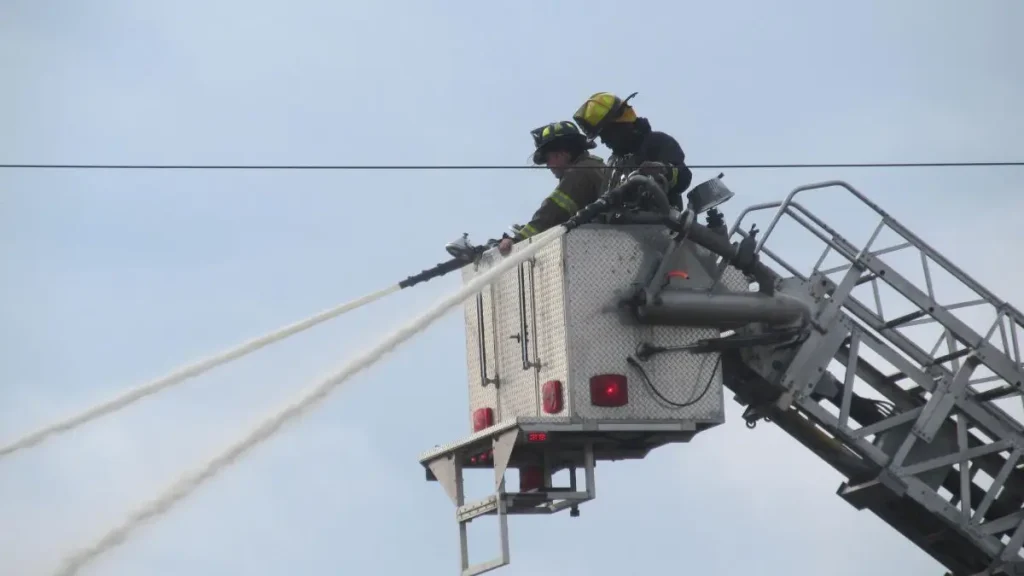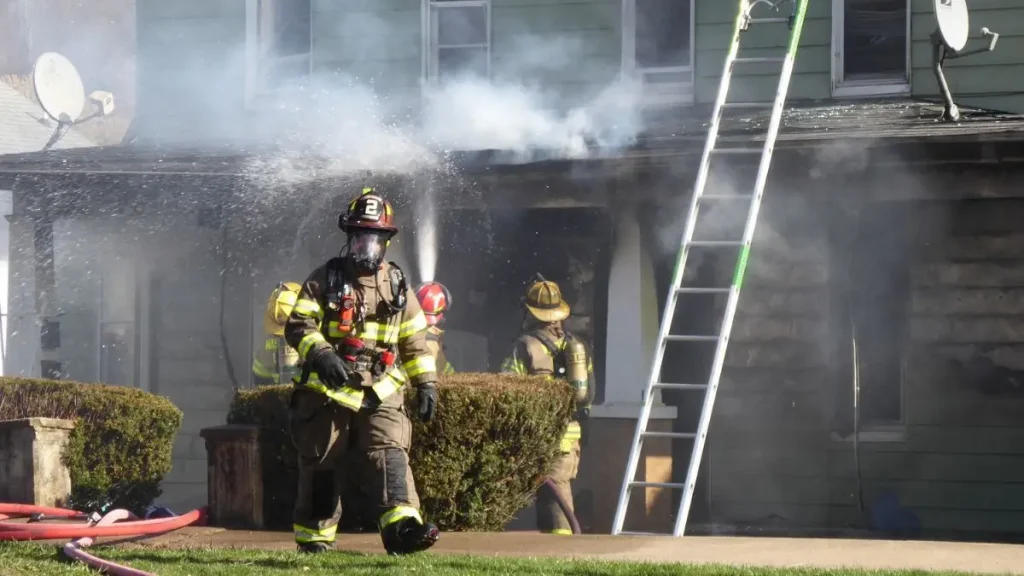Escambia County Blaze Kills Two Children, Dog in Mobile Home
I woke up to this story like most people did — with that heavy, sinking feeling you get when the news hits too close to home. Two children and their family dog lost their lives early Friday morning in a mobile home fire on Flaxman Street in Escambia County. The blaze broke out just after midnight, and within minutes, the home was engulfed.
Firefighters arrived around 12:56 a.m., battling intense flames inside the single-wide mobile home. By the time crews got in, it was already too late for the two young siblings — a 9-year-old boy and his 7-year-old sister. Their dog was found beside them. Two adults and another child survived but were rushed to nearby hospitals with burns and smoke inhalation.
The house is gone. The family is shattered. And the neighborhood that once heard laughter from that small front yard now stands in silence.
As I read this, I couldn’t help but ask myself — how many of us actually think about fire safety until it’s too late? How many homes around us could face the same risk tonight?
If you’ve ever lived in or near a mobile home community, what precautions do you take — or wish more people did?
The Fire That Shocked a Quiet Neighborhood

When I first read the report from WKRG, it struck me how fast everything unfolded. One minute, families in the Grand Oak Mobile Home Park were asleep — the next, the night sky was glowing orange.
Escambia County Fire Rescue got the call around 12:48 a.m. on Nov. 7. When firefighters reached the 5900 block of Flaxman Street, heavy flames and smoke had already swallowed the single-wide mobile home. Within minutes, two children and their dog were gone. The mother, her visitor, and another child barely made it out alive — all rushed to hospitals, one of them later transferred to a burn unit in Mobile.
What stays with me most isn’t just the loss; it’s how ordinary the night was before it turned into chaos. Families were sleeping. Lights were off. Everything felt safe — until it wasn’t. It reminds you how fragile our sense of “normal” really is.
Remembering the Children and the Family Behind the Headline
Neighbors say the two siblings were the kind of kids who made the street feel alive. “They were always out playing. They were sweet kids,” said Ron Capshaw, who lived next door. He told reporters that the family often helped him — giving rides when he didn’t have a car, checking in on him, treating him like one of their own.
Capshaw woke up around 3 a.m. that morning to find his power out. When he looked outside, police cars and flashing lights filled the street. He asked what happened — but no one could tell him yet. “It hurts me because they just were the least deserving for something like this to happen,” he said. “It was just a really sweet, sweet family.”
It’s these details that remind you the story isn’t about tragedy alone — it’s about people who mattered. A family that shared kindness. Kids whose laughter made the neighborhood better.
How Firefighters Responded That Night?
According to county officials, the first 911 call came at 12:48 a.m. Fire crews and EMS arrived by 12:56 a.m., facing a wall of fire and thick smoke. Inside, two children were trapped.
Crews fought the flames long enough to make entry — but by the time they did, the damage was irreversible. The fire was out by 1:17 a.m., but the loss had already burned deeper than anyone could measure.
If you’ve ever seen a mobile home fire, you know how quickly it spreads. Lightweight construction and limited exits make every second count.
Firefighters often have less than three minutes before the entire structure becomes unsafe. That’s the cruel math they work against — and sometimes, even their best isn’t enough.
A similar tragedy unfolded recently in Russellville, where two people died in a late-night house fire while firefighters fought through heavy smoke — a reminder of how unpredictable and devastating residential fires can be.
What We Know — and Don’t — About the Cause
Right now, investigators from the Florida Bureau of Fire, Arson and Explosives Investigations and the Escambia County Sheriff’s Office are still piecing together what happened. They haven’t released an official cause yet.
Was it electrical? A space heater? Faulty wiring? We don’t know. What we do know is that mobile homes are especially vulnerable — older models, in particular, can have aging circuits, thin walls, and fewer fire barriers. And sometimes, it’s not a big mistake that sparks disaster — it’s something small that goes unnoticed.
Until the results come in, all anyone can do is wait — and make sure their own home isn’t at the same risk.
I’ve been following similar fire incidents across Florida and sharing quick safety insights and local updates through a WhatsApp community focused on home safety. It’s where residents often discuss what worked for them — from fire escape plans to affordable smoke detectors.
Why Mobile Homes Face Higher Fire Risks — and What You Can Learn From This

I’ve covered enough incidents like this to see a pattern: mobile homes burn faster and deadlier than traditional houses. According to data from the National Fire Protection Association (NFPA), residents of manufactured homes are more than twice as likely to die in a fire compared to those in site-built homes.
That doesn’t mean mobile homes are unsafe — but it does mean they need extra care. Regularly test smoke alarms. Keep exits clear. Replace old wiring and heaters before they become hazards.
And if you live in a mobile home park, don’t wait for someone else to take the lead. Talk to your neighbors about escape routes. Check if the park has working hydrants or if you even know where they are. Small conversations like that can save lives.
It’s painful to think about how this tragedy might have been prevented — but that’s the only way to honor it: by learning, acting, and making sure the next family doesn’t face the same fate.
Even in sturdier homes, small sparks can lead to massive losses — like the Rhode Island garage blaze that spread to a family home earlier this year, proving that fire safety is never about where you live, but how prepared you are.
When Tragedy Reflects a Bigger Problem?
This fire wasn’t just an isolated heartbreak — it’s part of a bigger, quieter pattern. Across Florida and much of the U.S., mobile home fires keep taking lives every year, often in low-income neighborhoods where families are just doing their best to get by.
Data from the U.S. Fire Administration shows that mobile homes account for roughly one in every five fatal residential fires nationwide. The reasons are rarely dramatic — most come down to simple things: outdated wiring, space heaters too close to furniture, missing smoke alarms.
In places like Escambia County, many of these homes were built before 1994, when stricter HUD fire standards took effect. That means thinner insulation, older electrical systems, and faster flame spread. It’s a quiet risk, one that only gets attention when tragedy hits.
So yes, this story is about two children — but it’s also about the thousands of families living in homes just like theirs.
Earlier, a fatal house fire in Herndon, Virginia, also claimed two lives — showing that this growing pattern of home fires extends far beyond one county or state.
How the Community Is Trying to Heal?
The neighborhood hasn’t been the same since that night. A makeshift memorial now sits near the charred remains of the home — stuffed animals, flowers, candles, and handwritten notes from neighbors who still can’t believe it happened.
A GoFundMe campaign has been set up to help the family recover and cover funeral costs. Local schools and churches have come together, offering donations, meals, and emotional support. Some neighbors have started talking about organizing a fire safety awareness drive across the park.
When you lose kids like this — kind, joyful, giving — the only thing left to do is honor them through action. Grief can break people apart, or it can pull a community closer. Here, it seems to be doing the latter.
If you’ve ever lost someone in your neighborhood, you know what that silence feels like — the empty porch, the quiet where laughter used to be. But you also know how people show up when it matters. That’s what’s happening here.
What This Should Teach Every Mobile Home Resident?
If you live in a mobile home, please don’t read this story and think, “That could never happen to me.” Fires like these don’t care about zip codes.
Here’s what you can do — starting tonight:
- Check your smoke alarms. If you can’t remember the last time you changed the batteries, do it now.
- Plan two exits. Don’t rely on just one door — windows can save lives when seconds matter.
- Watch space heaters and extension cords. Most fires start with wiring or heating devices.
- Talk to your neighbors. Make sure everyone knows who lives where — in a crisis, that knowledge can save someone’s child.
Safety doesn’t come from fear. It comes from awareness, from small habits you practice when life feels normal — because normal can change in minutes.
Honoring Their Memory Without Losing Ourselves to Fear
Stories like this are hard to write — and even harder to read. Two children gone, a family broken, a dog that never made it out. It’s the kind of loss that ripples far beyond one street in Escambia County.
But the best way to honor them isn’t through sorrow alone — it’s by staying alert, by caring about the places we live in, and by not waiting for tragedy to remind us what matters.
If this story made you pause for a second, ask yourself this: When was the last time you checked your smoke alarm or talked to your family about an escape plan?
Sometimes, that single question is what keeps another headline like this from being written.
If you want to understand how communities recover and what safety lessons they leave behind, explore more fire safety stories on BuildLikeNew. Every story carries a lesson that could save a life.
Disclaimer: Details in this article are based on official reports available at the time of writing. The investigation into the Escambia County mobile home fire is still ongoing, and updates may follow. Our intent is to inform with empathy and accuracy, not to sensationalize this tragedy.


